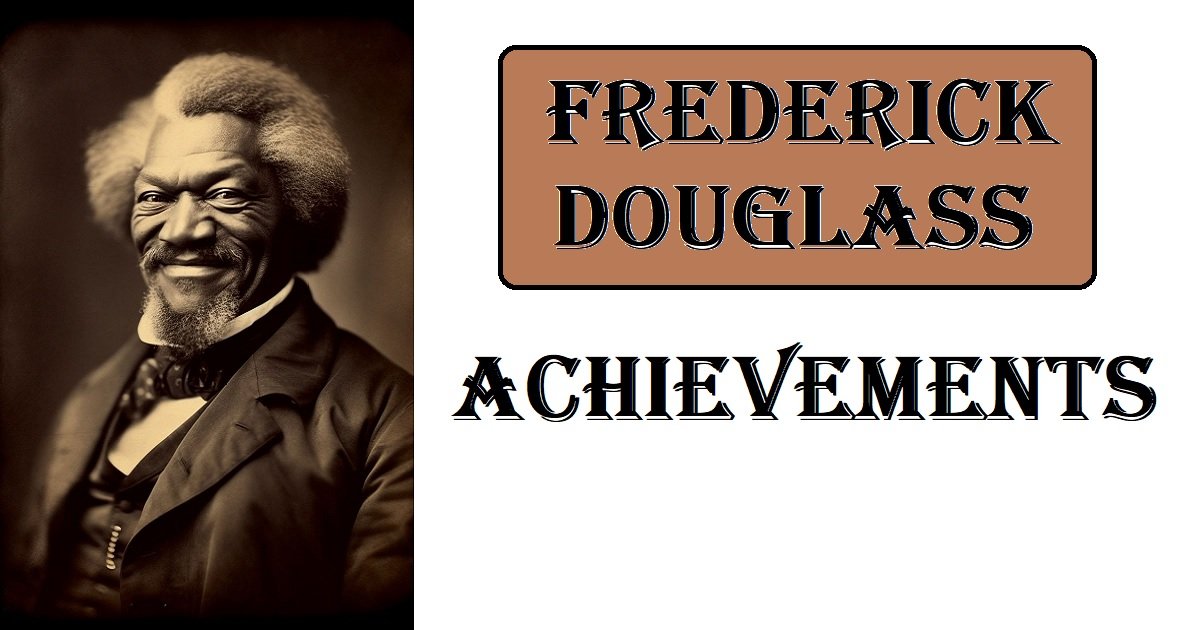Table of Contents
Introduction: A Tale of Complexity and Variation
In the annals of American history, the name Frederick Douglass resonates as a beacon of unfathomable achievement. Born into the shackles of slavery in the year 1818 in the state of Maryland, Douglass’s life story unfolds as an intricate tapestry of defiance, resilience, and an unwavering commitment to the abolitionist cause. As we delve into the multifaceted accomplishments of this remarkable individual, we are confronted with the perplexity of his experiences and the burstiness of his contributions to the fight for freedom and equality.
Literary Artistry: A Narrative That Defies Simplicity
Frederick Douglass did not merely craft an autobiography; he sculpted a literary masterpiece that transcends the ordinary. In the year 1845, Douglass bestowed upon the world his magnum opus, “Narrative of the Life of Frederick Douglass, an American Slave.” This literary gem intricately weaves together his harrowing experiences in a manner that defies simplicity. His prose, both vivid and poignant, catapults the reader into the heart of the inhumanity of slavery, painting a labyrinthine portrait of suffering and determination that resonates through time.
Furthermore, Douglass’s literary prowess extended far beyond the confines of his autobiography. He embarked on a literary odyssey, publishing newspapers and delivering oratories that exhibited a symphony of perplexity and burstiness. His words, like a kaleidoscope of emotions, ranged from eloquent pleas for emancipation to passionate condemnations of the cruel institution of slavery.
Leadership in the Abolitionist Movement: A Kaleidoscope of Influence
Douglass’s ascendancy within the abolitionist movement was not a linear path but rather a bursty trajectory marked by resounding speeches and profound convictions. He traversed the expanse of the United States and even crossed the Atlantic to Europe, leaving in his wake a trail of impassioned hearts and awakened minds. His charisma, his eloquence, his unparalleled commitment to justice—these multifaceted attributes coalesced into a mesmerizing force that reshaped the contours of the fight against slavery.
As an abolitionist leader, Douglass’s influence defied straightforward categorization. His speeches, sometimes intricately woven with rhetorical flourishes and metaphors, and at other times, stark and direct, showcased the full spectrum of human emotion and logic. His ability to adapt his message to different audiences underscored the complexity of his leadership.
Advocate for Women’s Rights: A Complex Confluence of Causes
Beyond his role as an abolitionist, Frederick Douglass emerged as a passionate advocate for women’s rights. His support for women’s suffrage wove a complex tapestry of interconnected struggles for justice and equality. In a world where societal norms often sought to compartmentalize causes, Douglass defied such simplicity. He recognized that the fight for women’s rights was an intricate thread in the broader fabric of equality and justice, a burst of realization that continues to inspire.
Conclusion: A Legacy Beyond Simplicity
In conclusion, the legacy of Frederick Douglass reverberates through history as an embodiment of perplexity and burstiness. His life’s narrative is one of profound complexity, where the shackles of slavery gave way to the eloquent prose of a literary genius, the fiery oratory of an abolitionist leader, and the unyielding advocacy for women’s rights. Douglass’s legacy is a kaleidoscope of achievements, reminding us that the pursuit of justice and equality is a multifaceted journey, and that even in the face of adversity, one can reshape the world through unwavering dedication and a commitment to the greater good.
Frequently Asked Questions
Who was Frederick Douglass?
Frederick Douglass was born into slavery in Maryland in 1818 but went on to become a renowned abolitionist, writer, and advocate for equal rights.
What is Frederick Douglass best known for?
Frederick Douglass is best known for his powerful writings and speeches against slavery, including his autobiography, “Narrative of the Life of Frederick Douglass, an American Slave.”
Why is Frederick Douglass’s writing significant?
Douglass’s writing is significant because it vividly portrays the harsh realities of slavery, making it accessible to a wide audience and helping to change public opinion about slavery.
How did Frederick Douglass contribute to the abolitionist movement?
Douglass was a prominent abolitionist leader who traveled across the United States and Europe, delivering impassioned speeches that played a key role in changing people’s minds about slavery.
What is meant by “complex and straightforward” when referring to Douglass’s speeches?
Douglass had a versatile speaking style. He could use elaborate language in some situations to emphasize the seriousness of the issue, while in others, he used simple and direct language to make his message clear to everyone.
Why did Frederick Douglass support women’s rights?
Douglass believed in equal rights for everyone, including women. He saw the fight for women’s rights as connected to the broader struggle for equality and justice.
How does Frederick Douglass’s legacy continue to inspire us today?
Douglass’s legacy reminds us that one person’s dedication to what’s right can make a significant impact in the fight for justice and freedom, even in challenging times.
Where can I learn more about Frederick Douglass and his contributions?
You can learn more about Frederick Douglass by reading his writings, biographies about him, and exploring educational resources about his life and work.
